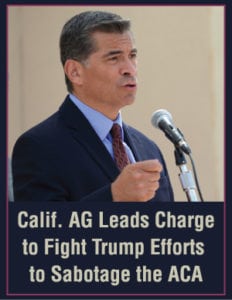 U.S. District Court Judge Vince Chhabria of the Northern District of California recently denied a request for an emergency injunction requiring the Trump administration to continue funding the Affordable Care Act’s cost-sharing reduction (CSR) payments. President Trump abruptly announced that his administration would stop paying the ACA’s cost-sharing reduction (CSR) payments. CSRs are provided directly to insurers to reduce out-of-pocket costs, like co-pays and deductibles, for lower-income consumers enrolled in the individual market. Trump’s decision immediately destabilizes the insurance market, drives up premiums, and creates widespread chaos because insurance companies are required to provide CSRs to eligible consumers, whether or not they receive the money from the federal government.
U.S. District Court Judge Vince Chhabria of the Northern District of California recently denied a request for an emergency injunction requiring the Trump administration to continue funding the Affordable Care Act’s cost-sharing reduction (CSR) payments. President Trump abruptly announced that his administration would stop paying the ACA’s cost-sharing reduction (CSR) payments. CSRs are provided directly to insurers to reduce out-of-pocket costs, like co-pays and deductibles, for lower-income consumers enrolled in the individual market. Trump’s decision immediately destabilizes the insurance market, drives up premiums, and creates widespread chaos because insurance companies are required to provide CSRs to eligible consumers, whether or not they receive the money from the federal government.
California Attorney General Becerra is leading a coalition of 18 states and the District of Columbia in suing to force the Trump administration to make the CSR payments. The states sought an emergency injunction to compel the Administration to make the payments. NHeLP filed an amicus brief in support of the states on behalf of Families USA and over two dozen other state-based and national consumer advocacy organizations, emphasizing the immediate threat posed by the President’s announcement.
Judge Chhabria noted that Covered California has lead the way by preparing stopgap measures to protect California consumers from bearing the burden of the president’s rash decision. Next year, Covered California is implementing a “CSR surcharge” that requires Covered California’s 11 insurance carriers to load the lost revenue of CSRs onto Silver-level premium rates. Although this surcharge will increase Silver premiums by 12.4 percent on average, most consumers will not see a significant change in the net price they pay for their monthly premium because the approach is intended to keep premiums affordable for people, so the federal government covers excess increases. Consumers who are eligible for subsidies will receive increased financial help in the form of increased Premium Tax Credits (PTCs) to offset the premium increases caused by the CSR loss. Consumers who are ineligible for subsidies will face significantly higher premiums but will be encouraged to shop and compare through Covered California for a different plan or to purchase insurance directly from an insurance company. In 2018, California insurers are required to provide an off-Exchange plan that provides essentially the same scope of benefits as the on-Exchange plan without the “CSR surcharge” to allow consumers currently enrolled in Silver unsubsidized plans to retain an affordable option.
Although Covered California is attempting to protect consumers, as the Families USA/NHeLP amicus brief illustrates in detail, confusion and fear remain. Because of uncertainty about CSR funding, one major insurer has already decided to partially leave Covered California next year, forcing thousands of consumers to search for a new plan and possibly disrupt their care. Now that Trump has announced that the funding will definitely stop, more plans are likely to follow suit. The irony of this decision is that it substantially increases the costs for the federal government by increasing subsidies for all individuals up to 400 percent FPL to offset the loss of CSR funding for individuals only up to 250 percent FPL. The Congressional Budget Office recently projected that ending the CSRs would cost the government $194 billion by 2026.
Given Judge Chhabria’s ruling, it will be even more important this year to ensure that consumers have education and assistance in choosing a plan during Covered California’s open enrollment period for 2018, so they do not inadvertently chose a plan with much higher premiums or cost-sharing. Open enrollment for Covered California will run from November 1, 2017 – January 31, 2018.